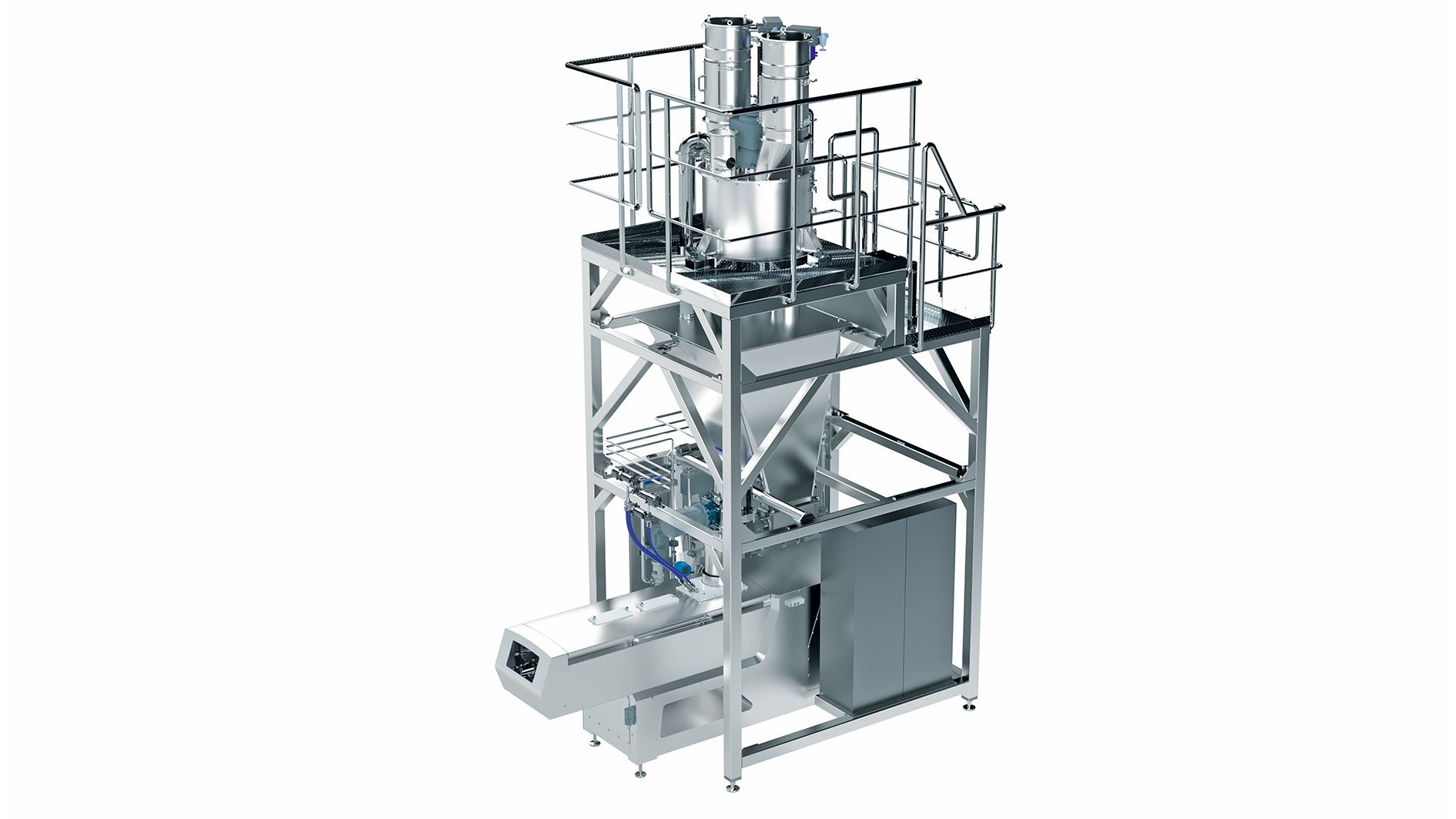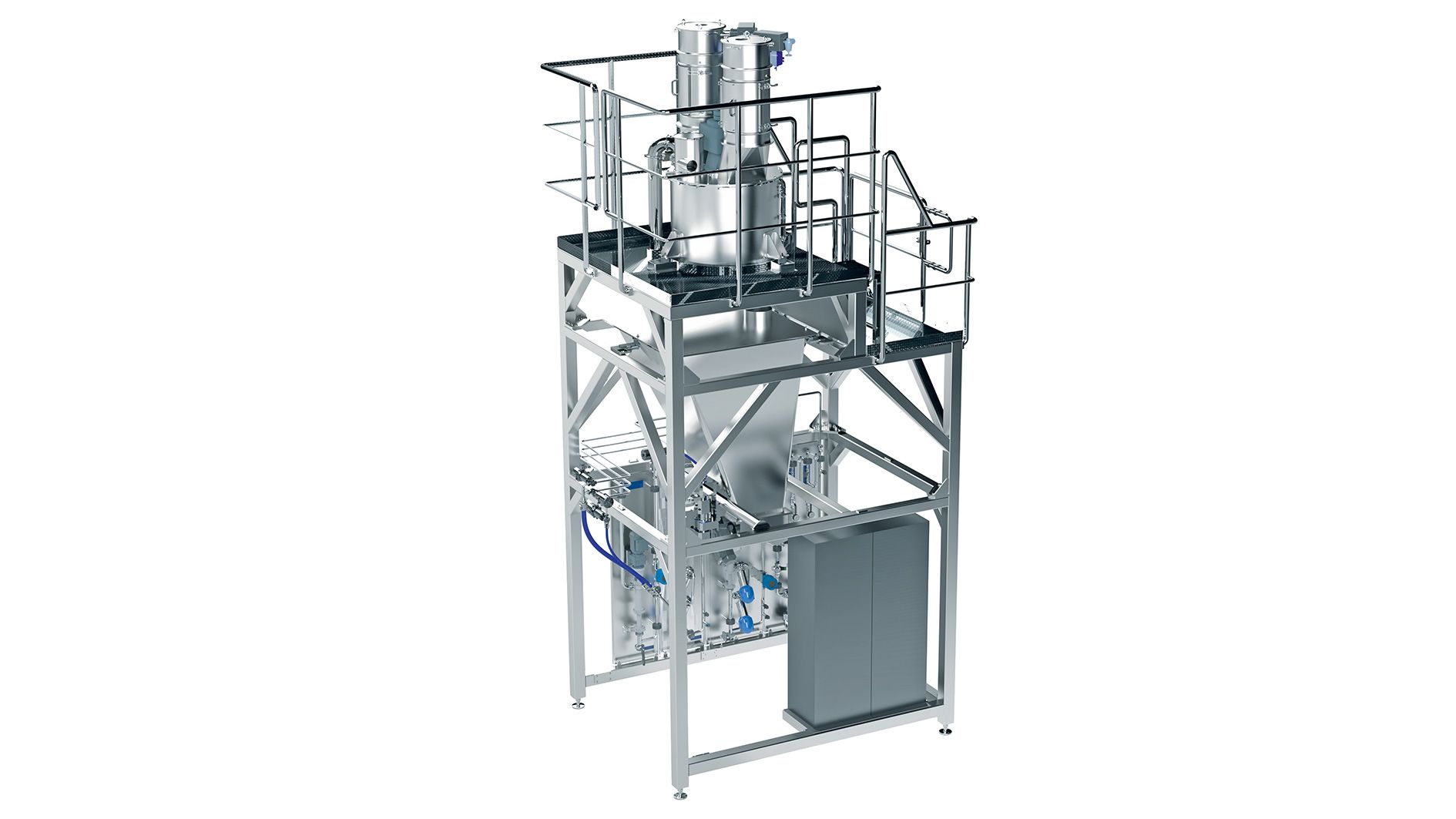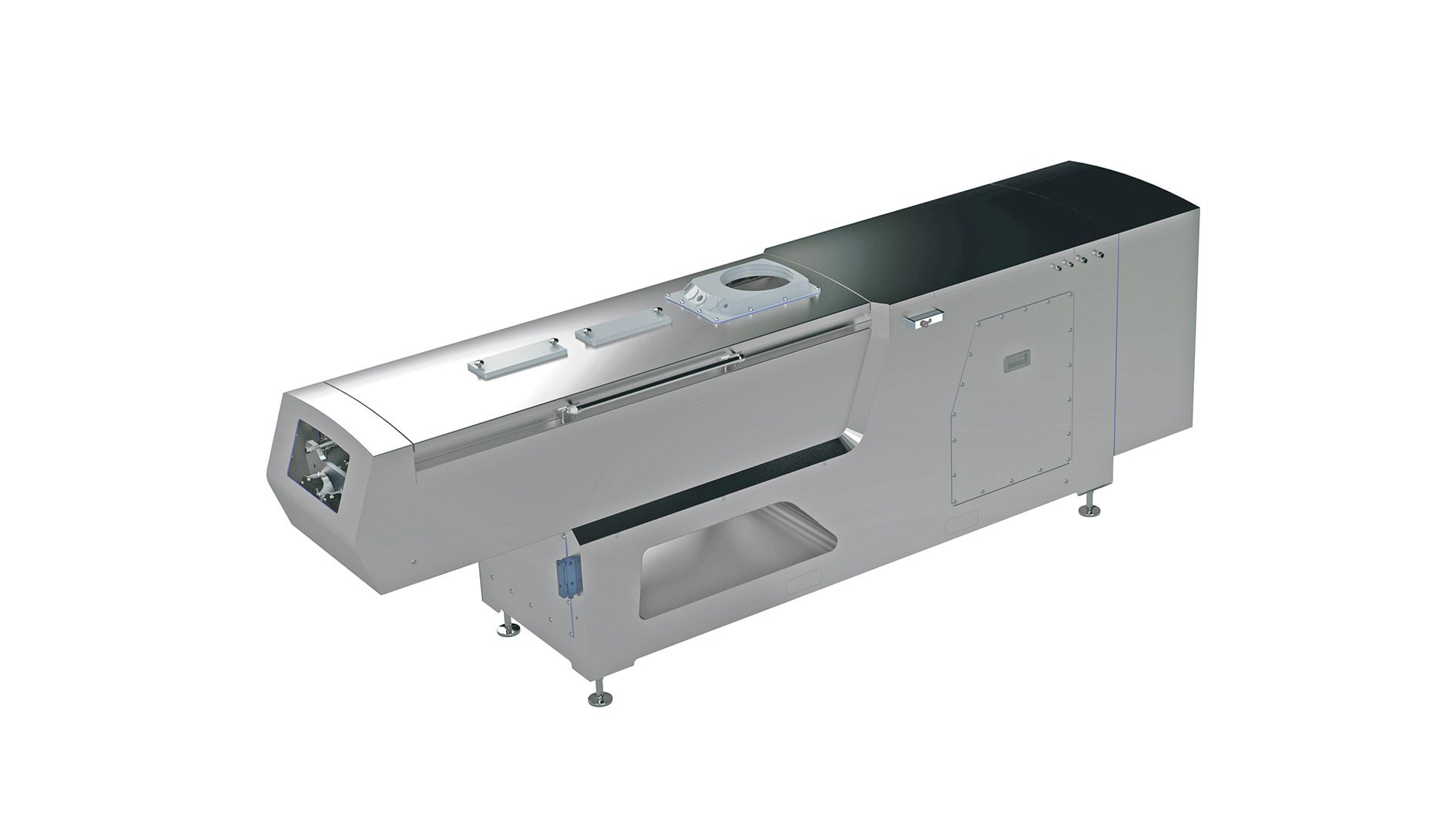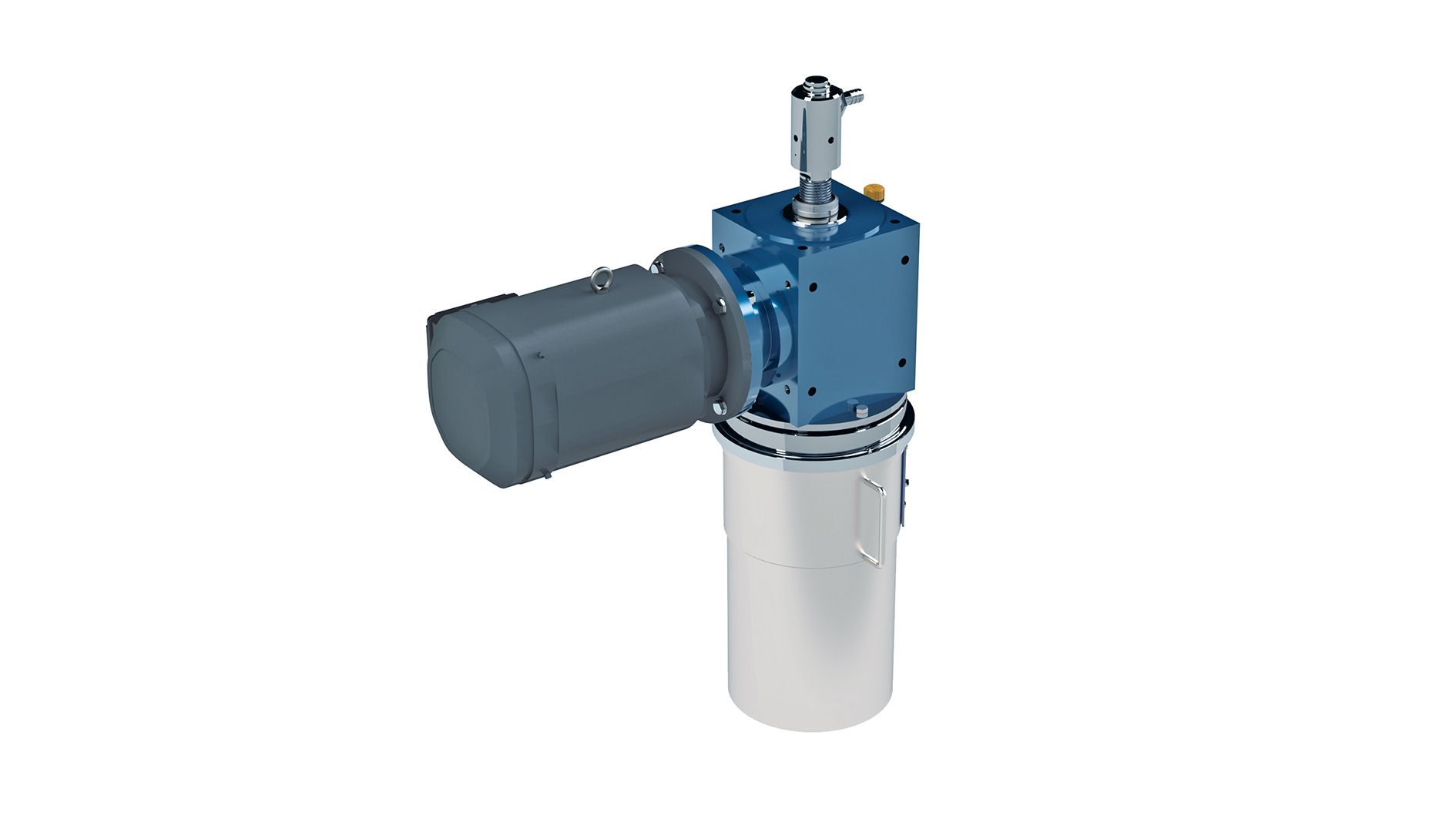Whether rolls, baguettes or other baked goods – the aim is always consistent, high quality. It all starts with a perfectly prepared dough. This is exactly what you can expect from the innovative and continuously operating CODOS ® mixing and kneading system.
After modernization and reworking, the well-known and well-tried Codos® system concept has been repositioned and introduced to the market as Fresh-Up, a modular mixing and kneading system with new components. The complete system consists of a CODOS® tower, a DymoMix® and a CODOS® NT kneader.
CODOS® tower– Liquid and solid matter dosage to feed the continuous system.
The CODOS® tower is the initial unit in the CODOS® system. It consists of a storage container with mixing tool and a differential weigh feeder positioned underneath to produce a continuous and constant mass flow of powdered raw materials.
In the bakery, mostly cereal flours are dosed. Other raw materials such as starch, proteins or dextrins for gluten-free products can also be processed without any problems. The Codos® tower also includes the water dosing and temperature control as well as dosing for other liquids such as yeast suspension or oil.
The liquids are continuously metered together with the powdered raw materials. The pumps used for dosing liquids and the flow meters as well as the necessary valves are located on liquid panels on the CODOS® tower. The panels with the aggregates and instruments are also modular, highly accessible and can easily be replaced.
DymoMix® - Special hydration leads to better dough quality.
The DymoMix® hydration system can be used as a premixer in the Codos® system and as a complementary production step between dosing and kneading of doughs or other further processing steps. The special feature is that powdery components are hydrated with water or oil, immediately forming a homogeneous mixture. This procedure allows the production of improved-quality dough. Hydrating with water or oil is accomplished by a specially designed nozzle built into the rotating shaft of the unit. This forms a liquid film through which the powdered particles must pass, becoming hydrated. Unlike conventional systems, a high-pressure water jet is not used for hydration. As a result, even at low moisture contents, a high-quality product can be produced, ready to be processed immediately without intermediate steps. This makes the DymoMix® an ideal device. The CODOS® tower and DymoMix® and CODOS® NT kneaders can be used in different combinations, for different applications:
- For the production of pumpable pre-doughs or liquid doughs that are to be fermented (e.g. liquid sponge or sourdoughs).
- For the production of premixed bread or roll doughs, which are continuously kneaded in the CODOS® NT kneader.
Outside the baking industry for e.g.
- For hydration of dry materials (starch, proteins, dextrins)
- For moistening with oil or liquid fats
| CODOS® NT - Optimum dough quality through gentle kneading process |
Dough is formed in the horizontally operating continuous CODOS® NT kneader. Special helical interlocking twin shafts apply the energy required for kneading to the dough. This forms the gluten structure of the wheat dough. The bow shape of the kneading attachments on the twin shafts ensures gentle kneading without cutting the dough. The energy input required for the specific product can be controlled via the speed of the kneading shafts, as can the dwell time of the dough. Thanks to a double-walled, temperature-controlled trough design, the dough always maintains the desired temperature. This allows the specified temperature of the dough to be maintained within narrow limits.
Temperature control during the mixing process
To make a croissant, a chilled, laminated dough is required. In this case, the flour is kneaded with ice water so that the dough temperature is 18 °C or even lower. Alternative cooling solutions such as CO2 or ice are not required for temperature control with CODOS® NT kneaders. This leads to considerable savings in the cooling process.
For hamburger buns, however, a warm dough of about 28-30°C is needed. In this case, the mixing water temperature is automatically controlled so that the dough has the correct temperature after kneading.
Dosing of sensitive raw materials
Depending on the recipe requirements, ingredients can be added at any point of the mixing and kneading process. For example, to produce a high-quality pretzel dough, it is necessary to add the high fat content after mixing but before kneading.
Process flexibility also allows control of the dwell time of individual components. As a result, sensitive raw materials such as fruit chunks or flakes can be fed at the end of the process and incorporated with minimal impact.
More power, lower energy consumption
The CODOSs® system features a compact, space-saving design.
With an output range between 500 and 6,000 kg/h, the new generation of CODOS® NT is a big step up in terms of capacity and efficiency over previous models. Advantages include precise temperature control, raw material metering accuracy, and low energy and maintenance requirements.
The high-torque water-cooled servo motor offers savings on energy and space. It is also flexible and easy to use, requiring fewer controls. The design incorporates ease of operation and maintenance without the need to disassemble the shaft. A hood was incorporated for quick access to replace seals, bearings or couplings.
These are the only parts that require regular replacement, minimizing maintenance costs. Hygiene requirements were also taken into account, such as a fully automatic cleaning system.
The same system can be used for doughs with broadly differing requirements and characteristics; it is ideal for doughs of every variety, whether they require a high energy input, such as sandwiches and rolls, or a low energy input, such as pastries or certain cookie doughs.
Summary: Particularly efficient
The CODOS® system is noted for two special features:
The continuous mode of operation results in extremely uniform dough preparation and constant dough ripeness and stability even before baking, especially with medium and large throughputs. Fluctuations in quality and weight, unavoidable up to now due to different dough aging in separate batches, are now a thing of the past.
The mixing of ingredients and the kneading of the dough can be processed separately.
The main area of application for the CODOS® system are monolines, where production can run around the clock.
The new CODOS® NT line is currently available in two different sizes:
CODOS®NT 160: Dough capacity from 500 kg to 3 t /h
CODOS®NT 200: Dough capacity from 2 t - 6 t/h
Author:
Dr. Christian Faber
Senior Technology Consulting



